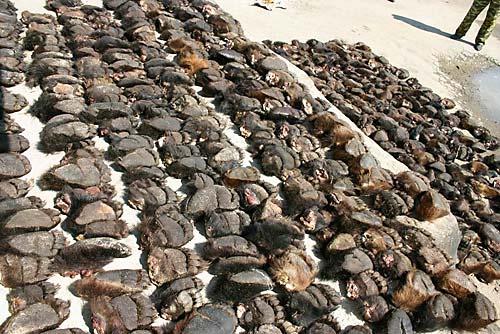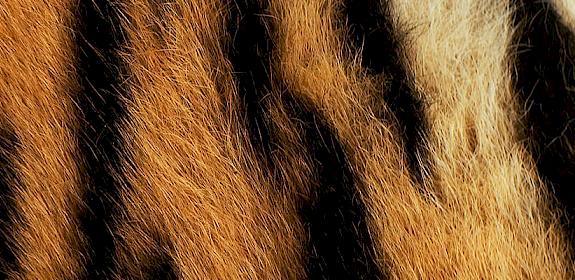Tough penalties for organized smuggling gang
Moscow, Russia, 30th May 2008—The Primorskii regional court has handed out stiff penalties on six men—three each from China and the Russian Federation—after they were found guilty of attempting to smuggle bear paws, Amur Tiger and other wildlife parts from the Russian Far East into China.

Their arrest, in August 2007, followed a six month operation by Customs and the Frontier Service in the Russian Far East Primorskii Province which uncovered the entire smuggling chain, from source to destination.
In total around 900 bear paws of Brown and Asiatic Black Bears, 4 Amur Tiger skins, more than 60 kg of Tiger bones and 531 Saiga horns were involved. TRAFFIC and WWF experts were asked for independent evaluations of the confiscated wildlife products, and estimated the commercial value to be more than USD200,000.
Following a two month trial the two ring-leaders—Alexei Razumenko and Ji Wenbin—were each sentenced to 8 years in jail and fined RUB200 000 (USD8,500). Razumenko managed the logistics of the operation whilst Ji was the main buyer, who travelled throughout the region ordering and paying for illegal wildlife goods. Their two Chinese accomplices each received jail sentences of 7 years 6 months, whilst their two Russian accomplices each received 4 years 6 months.
“The latest prosecution marks the start of wildlife crime being treated with the seriousness it deserves” commented Natalia Pervushina, co-ordinator of TRAFFIC’s Russian Far East programme, adding that the trial had created a great deal of public interest because of the exceptionally high number of threatened wildlife parts involved.
“Unfortunately there was no follow-up to prosecute those responsible for the illegal killing of Tigers and bears to supply the smugglers,” commented Gennady Zherebkin, a law enforcement advisor from the Amur branch of WWF Russia. “Once again, our threatened wildlife has paid the price.”
Amur Tiger and Asiatic Black Bear are listed in the Russian Red Data Book and in Appendix I of CITES (the Convention on International Trade in Endangered Species of Wild Fauna and Flora), meaning all international commercial trade is prohibited. Brown Bear is listed in Appendix II of CITES, meaning all international trade is strictly regulated.
The smugglers were first caught in January 2007 when a car stuffed with 8 bags of bear paws, 3 Tiger skins, several horns and other animal parts had been stopped by Police on the road to Khorol village, Russia. In March 2007, sledges with a cargo of 120 bear paws were intercepted as they were being transported across the frozen Khanka Lake into China, but the smugglers escaped on snow mobiles.
Following the two seizures, Ji had tried to restore the confidence of his Chinese partners by assembling a large shipment of Tiger skin and bones, and bear paws. In August 2007, Ji bribed local policemen to ensure the shipment’s smooth passage to Khanka Lake, where Razumenko paid a villager to turn off the border tracking system. However, enforcement authorities were ready, and the smugglers were caught red-handed. The sentences were handed out as punishment for the August shipment only.
As a result of the successful prosecutions, a well-established wildlife smuggling route in the region has been effectively dismantled.



